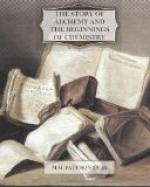The atomic theory was used by the great physicists of the later Renaissance, by Galileo, Gassendi, Newton and others. Our own countryman, John Dalton, while trying (in the early years of the 19th century) to form a mental presentation of the atmosphere in terms of the theory of atoms, rediscovered the possibility of differences between the sizes of atoms, applied this idea to the facts concerning the quantitative compositions of compounds which had been established by others, developed a method for determining the relative weights of atoms of different kinds, and started chemistry on the course which it has followed so successfully.
Instead of blaming the Greek philosophers for lack of quantitatively accurate experimental inquiry, we should rather be full of admiring wonder at the extraordinary acuteness of their mental vision, and the soundness of their scientific spirit.
The ancient atomists distinguished the essential properties of things from their accidental features. The former cannot be removed, Lucretius said, without “utter destruction accompanying the severance”; the latter may be altered “while the nature of the thing remains unharmed.” As examples of essential properties, Lucretius mentions “the weight of a stone, the heat of fire, the fluidity of water.” Such things as liberty, war, slavery, riches, poverty, and the like, were accounted accidents. Time also was said to be an accident: it “exists not by itself; but simply from the things which happen, the sense apprehends what has been done in time past, as well as what is present, and what is to follow after.”
As our story proceeds, we shall see that the chemists of the middle ages, the alchemists, founded their theory of material changes on the difference between a supposed essential substratum of things, and their qualities which could be taken off, they said, and put on, as clothes are removed and replaced.
How different from the clear, harmonious, orderly, Greek scheme, is any picture we can form, from such quotations as I have given from their writings, of the alchemists’ conception of the world. The Greeks likened their imaginings of nature to the natural facts they observed; the alchemists created an imaginary world after their own likeness.
While Christianity was superseding the old religions, and the theological system of the Christian Church was replacing the cosmogonies of the heathen, the contrast between the power of evil and the power of good was more fully realised than in the days of the Greeks; a sharper division was drawn between this world and another world, and that other world was divided into two irreconcilable and absolutely opposite parts. Man came to be regarded as the centre of a tremendous and never-ceasing battle, urged between the powers of good and the powers of evil. The sights and sounds of nature were regarded as the vestments, or the voices, of the unseen combatants. Life was at once very real and the mere shadow of a dream. The conditions were favourable to the growth of magic; for man was regarded as the measure of the universe, the central figure in an awful tragedy.




